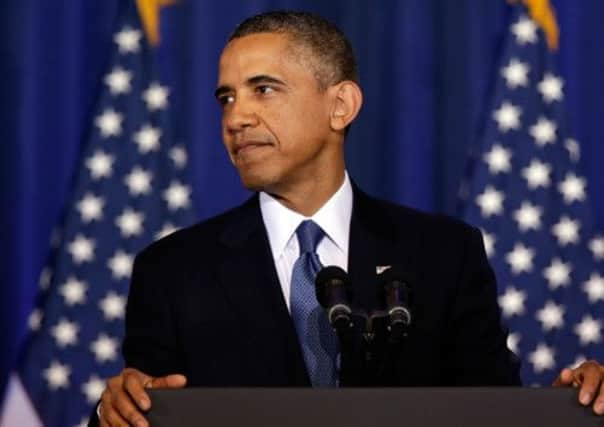Barack Obama: Terror threat has evolved since 9/11


In a major foreign policy speech yesterday, Mr Obama limited the scope of former president George W Bush’s global war on terror, sparked by the 11 September 2001 attacks.
“Our nation is still threatened by terrorists,” he said at Washington’s National Defence University. “We must recognise, however, that the threat has shifted and evolved from the one that came to our shores on 9/11.
Advertisement
Hide AdAdvertisement
Hide Ad“Neither I, nor any president, can promise the total defeat of terror. What we can do – what we must do – is dismantle networks that pose a direct danger, and make it less likely for new groups to gain a foothold, all while maintaining the freedoms and ideals that we defend.”
Faced with increasing criticism about the use of unmanned drones to wage war in distant lands, Mr Obama said America would only use the remote-controlled aircraft when a threat was imminent, a slight change from the previous policy of launching strikes against a significant threat.
“To say a military tactic is legal, or even effective, is not to say it is wise or moral in every instance,” he said.
He acknowledged civilian deaths sometimes resulted from drone strikes, which some claim fuels radicalisation, but said he grappled with that trade-off. “For me, and those in my chain of command, these deaths will haunt us as long as we live,” he said. Before any strike, he said, “there must be near certainty that no civilians will be killed or injured – the highest standard we can set”.
Under a new presidential guidance signed on Wednesday, the president said the US defence department would take the lead in launching drones, as opposed to the current practice of the CIA taking charge.
Any drone strike will only be launched when a terror suspect cannot be captured. The US will respect state sovereignty and will limit strikes to al-Qaeda or associated targets, he said.
The use of drones to attack extremists has increased tensions in countries such as Pakistan and drawn criticism from human rights activists. Mr Obama’s statement yesterday was a concession to those who demanded greater openness.
On Wednesday, the White House acknowledged four Americans abroad had been killed in drone strikes since 2009 in Yemen and Pakistan, including militant cleric Anwar al-Awlaki. Mr Obama defended this, saying when a US citizen goes abroad to wage war against the US, his citizenship should not be a shield. He accepted it would not be constitutional to use drones in US airspace.
Advertisement
Hide AdAdvertisement
Hide AdThe president has been unable to carry out a 2008 campaign pledge to close the prison in Guantanamo Bay. A hunger strike by 103 of the 166 detainees has put pressure on him to take action.
“There is no justification beyond politics for Congress to prevent us from closing a facility that should never have been opened,” he said. While Mr Obama cannot close it on his own, he did announce steps aimed at getting some prisoners out. He lifted a moratorium on detainee transfers to Yemen.
He called on Congress to lift restrictions on other transfers and directed the defence department to identify a site to hold military tribunals for Guantanamo detainees.
Use of drones in Pakistan to be curtailed amid fears of backlash
IN PAKISTAN alone, up to 3,336 people have been killed by US drones since 2003, according to the New America Foundation.
Presidential advisers say the new guidelines announced yesterday will limit drone strikes in Pakistan and are in line with a future decline in Afghanistan ahead of troop withdrawal next year. Drone strikes elsewhere will continue. The guidelines will apply to strikes against both foreigners and US citizens abroad.
Despite the US defence department being given greater control over the drones, the CIA is still expected to maintain control in Yemen, as well as in Pakistan’s tribal areas, given the concern that al-Qaeda may return as Nato withdraws. The US military and the CIA work side by side in Yemen, with the CIA flying its drones over the northern region out of a covert base in Saudi Arabia, and the military flying its unmanned aerial vehicles from Djibouti.